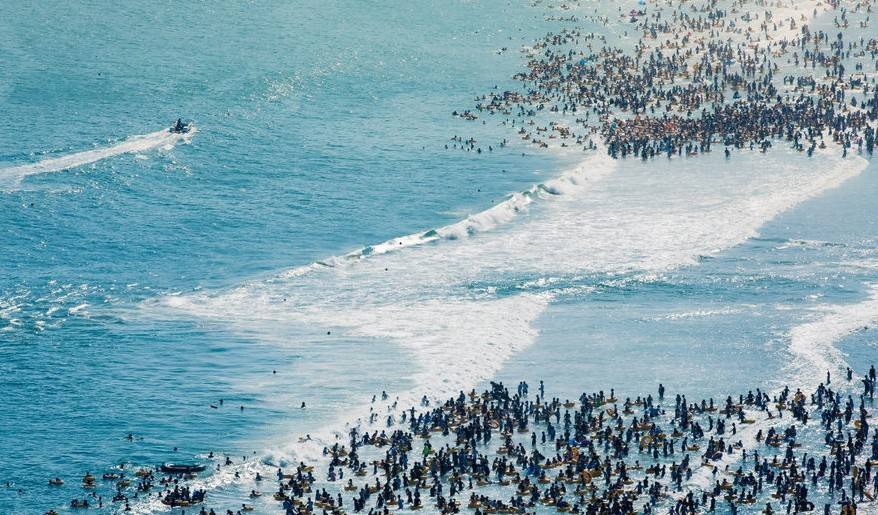Dialogue 1
Jingjing: Mark, did you hear about the twin sisters that drowned in the ocean at Qingdao?
京晶: 馬克,你聽說了青島海邊溺亡的女孩那件事嗎?
Mark: That was all over the news a week ago. What a sad story! Thery were only 8.
馬克:一周前,這條新聞鋪天蓋地。真是個令人悲傷的故事,她才8歲。
Jingjing: Yeah. People are really puzzled about how it happened. There's something called a rip current, which was believed to be the cause. Most people don't know about it.
京晶:是啊。人們也弄不懂事情到底是怎么發生的。有一種叫做離岸流的海浪,被認為是元兇。大多數人對此一無所知。
Mark: Right, that's one of the dangerous things about swimming at a beach.
馬克:沒錯。那個就是在海邊游泳的幾大危險之一。
Jingjing: From what I read about rip currents, the water can move as fast as 2.5 meters per second, though typically it moves at a rate of 0.5 meters per second.
京晶:從我了解到的關于離岸流的知識來看,水的流速可達到每秒2.5米,盡管通常情況下流速是0.5米每秒。
Mark: Hmm. I know that a rip current is basically a flow of water moving quickly away from a beach. How is it different from an outgoing tide?
馬克:嗯。我知道離岸流是一股快速離開海岸的浪潮。它跟退落的潮水有何不一樣?
Jingjing: Well, the tide takes several hours to move out. Waves can reshape the shelf of sand under the water near a beach.
京晶:潮水退落一般需要好幾小時。浪潮能夠重塑海灘附近水下的沙洲形狀。
Mark: Yeah, but how would that create a narrow and rapid current?
馬克:對啊,那又如何能夠制造出狹窄而迅急的水流呢?
Jingjing: A beach usually has a sandbar. That's a strip of sand under the water that is raised, making the water shallower. When the waves break a hole in the sand bar, the current flows through that neck, forming a rip current.
京晶:一片海灘通常有一塊沙洲。就是水面下升起的一條沙帶,能讓水流變淺。但海浪在沙洲沖出一個洞,從洞口處沖出的水流就形成了一股離岸流。
Mark: That's pretty clear. Is there any way to recognize a rip current before you get into the water?
馬克:解釋得很清楚。在你下水之前,又沒有什么好辦法能夠辨認出離岸流呢?
Jingjing: If you look at the breakers and see a flat spot running back from the beach between a few of them, that might be a rip current.
京晶:如果你看見了碎浪,同時看見了一個平點在碎浪中從海灘后撤,那個可能就是離岸流。
Mark: I guess that's good for avoiding one that has already formed.
馬克:如果能認出來對于避免一個已經形成的離岸流還是不錯的。
Jingjing: They do form suddenly. If you get into the water and notice alternating deep and shallow spots as you walk farther and farther out, you can also know there's a danger of a rip current.
京晶:它們的確形成得非常突然。如果你已經下水了,同時在越走越遠時注意到有交替的深淺點出現,你也能夠知道可能會出現離岸流的危險。
Mark: Wow, I'm glad you read up about that, Jingjing.
馬克:哇哦,真好你了解得這么多。
New words : 習語短語
all over the news
鋪天蓋地地出現在新聞中
be reported by many news channels and posted on social media
tide 潮水
when the water level rises and falls along the shore (incoming/outgoing tide)
shelf 沙洲
10-100 meters of shallow, usually sandy, area under the water near a beach
breakers 碎浪 waves that roll toward a beach
Dialogue 2
Jingjing: Mark, are you a very good swimmer?
京晶:馬克,你是一個游泳好手嗎?
Mark: No, not really. But I am pretty adventurous. I've actually been caught in a rip current.
馬克:不算是吧。但是我很有冒險精神。事實上我有一次就遭遇了離岸流。
Jingjing: Really, what was it like?
京晶:真的嗎?那是怎么一回事?
Mark: Umm, it could have just been a very strong outgoing tide. There were small breakers where I was swimming, but they only splashed over me without pushing me in toward the beach. Meanwhile, the current kept pulling me out.
馬克:嗯,應該就是一股很強的退潮。我游泳的地方有許多碎浪,但它們只是拍打在我身上,并沒有把我推回沙灘,與此同時,離岸流把我往海里拽。
Jingjing: Did you panic?
京晶:你當時驚慌了嗎?
Mark: I started to, but then I realized I'd better relax. I was swimming in a bay, and remembered what my dad told me about currents near the beach: that it's better to swim parallel to the shore and find a place where the current is weaker, then make my way back to the beach.
馬克:開始有一點了,后來我意識到最好放松點。我當時是在一處海灣游泳,同時也記得父親跟我說過如果遇到海灘附近的岸潮,那就沿著平行于海岸的方向游動,找到一個離岸潮水流較弱之處,然后再游回岸邊。
Jingjing: Did you do that?
京晶:你是那樣做的嗎?
Mark: Yeah. The bay was pretty wide, and I wasn't looking forward to swimming all that distance. So, I turned a little toward the shore after a while. Then it was easy to get back.
馬克:是的。那個海灣非常寬闊,我也沒想要游太遠,所以游了一會兒以后我就開始往回游,這樣回到岸邊就比較容易。
Jingjing: You were lucky.
京晶:那你很幸運了。
Mark: Sure. Like I said, it might not have been an actual rip current.
馬克:是的。就像我說的,有可能那也不是一個真正的離岸潮。
Jingjing: It's good you knew a thing or two about swimming in the ocean.
京晶:你能知道一些在海里游泳的事是很好的。
Mark: I guess so. It's good for kids to have experience in strong moving water. A wave pool is good for that.
馬克:我想也是。孩子們在強烈流動的水中有些經驗是很好的。比如一個波浪泳池。
Jingjing: I've been in one of those. The first time was pretty scary.
京晶:我體驗過,第一次感覺挺害怕的。
Mark: Yeah, but you were in a mostly safe environment. Then if you go swimming in a natural body of water, you're better prepared for the feeling of being swept away.
馬克:但你還是在一個總體安全的環境里。但你在一個天然的水域游泳時,你最好準備好迎接那種被沖走的感覺。
Jingjing: I guess so. But when I go to the beach, I like to go in up to my ankles and leave it at that.
京晶:我想是的。但是當我去海邊時,一般水剛沒過腳踝就夠了。
New words : 習語短語
panic 驚慌失措
become anxious and unable to think clearly
bay 海灣
part of a coastline that opens as a mouth to contain ocean water
parallel 平行的,并列的
in the same direction as
wave pool 人工浪池
a man-made pool with waves
natural body of water 自然水域
a river, the ocean, a lake
adj. 喜歡外出的,離開的,外向的 n. 外出,開支,











